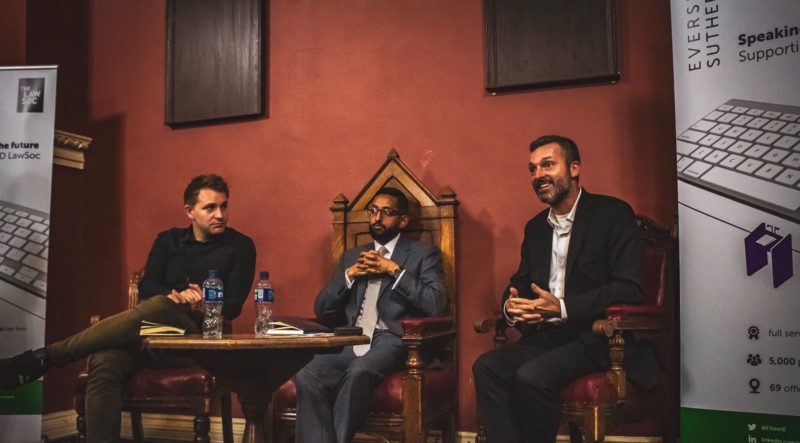A bustling crowd gathered in the Graduates Memorial Building (GMB) on Monday to hear Max Schrems, Ravi Naik, and Prof David Carroll discuss data privacy.
Milly Farrell Kelly, the Auditor of Trinity College Law Society (LawSoc), introduced the guests as “world-renowned activists in the fight for data rights”, and took turns with editor-in-chief of Trinity College Law Review, Celia Reynolds, in detailing their backgrounds.
The audience remained eager and attentive as the two discussed the people who had played roles in burgeoning scandals surrounding data-brokering giants such as Facebook and Cambridge Analytica.
After being presented with the Praeses Elit award, given to individuals in recognition of excellence in their fields, the panellists addressed the audience. Carroll, known for taking legal action against Cambridge Analytica, which inspired Netflix documentary The Great Hack, went first. He established himself as emotive and forthright, insisting that Facebook’s targeted political advertisements were “fermenting authoritarianism around the world”.
Carroll retained the crowd’s attention with dramatic pauses and bold rhetoric, finishing on the hopeful note that the world could do with the leadership and advice of all young lawyers in the room.
Naik, Carroll’s solicitor, developed on the issues already raised in a lawyerly and matter-of-fact manner. His argument was structured and his point was clear – what had happened until now was only the tip of the iceberg. “We should not consider Cambridge Analytica in isolation”, he said. “Their tools are relatively standard within the industry.”
Framing digital rights as fundamental human rights, Naik said he believes that the next generation should foster the General Data Protection Regulation (GDPR) and other nascent privacy documents as digital constitutions of sorts. He ended his speech by expressing the opinion that recent events were “an opportunity to shape the law to protect our futures”.
Throughout his colleagues’ presentations, Austrian lawyer and activist Max Schrems had remained aloof, scribbling down notes with a pensive look on his face. It was surprising, then, when he took to the podium with a humorous and light-hearted tone. Having risen to prominence for challenging Facebook’s transfer of his personal data overseas to the US National Security Agency, Schrems appeared to acknowledge the absurdity of his situation, laughing to himself about how a single complaint he had made spiralled into a major global matter.
In spite of his string of jokes, Schrems’s perspective was decidedly less optimistic than the others. He painted a worldview of a closed-off internet, characterised by monopolies and a lack of competition and choice for consumers.
He was at pains to highlight Ireland’s role in data protection issues, particularly due to the volume of big tech companies headquartered in Dublin. Noting extensive delays in getting cases pushed through the Irish system, Schrems stated: “The bigger problem is enforcement, not the law itself.”
The three were met with applause as the event progressed to a questions and answers session directed by Kelly and Reynolds. A slew of hands shot up at every chance possible, suggesting that the event could have run for another hour if everyone had their say. The panellists spoke naturally and riffed off of each other, answering questions on topics ranging from Brexit to the right to free election.
The most striking answers were given by Carroll when asked about the future of consumer consent to data gathering. “Why do you even need to be asked for consent?”, he asked. “If you were really honest, you wouldn’t need to put up cookie requests. You’re being spied on.”
Naik showed an extensive understanding of current legal issues. In response to a question about Artificial Intelligence (AI), he suggested that an AI like Google Search could become so advanced as to develop its own legal personality, meaning Google would no longer be liable for its actions.
On that note, Law Soc and TCLR gave thanks for an engaging discussion, bringing the event to an end. Notwithstanding worrying predictions like Naik’s, most left the room assured that change was possible, making it easy to have some sense of hope for the future.
Correction: 22.43, September 25th, 2019
An earlier version of this article’s headline said that data experts had visited LawSoc, omitting the fact that the event was co-hosted with Trinity College Law Review. This article has since been updated.







